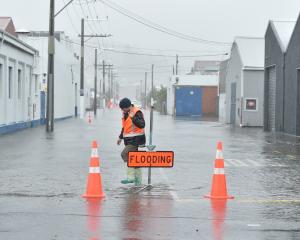Given Breton Dukes often evokes a strong sense of place in his short stories, there's a chance one or two of the towns he visited on a recent South Island sojourn might pop up in a forthcoming tale.
The trip was a mystery tour, organised by his wife Elizabeth to celebrate his 40th birthday, the destinations unfolding via a series of twists and turns. Which is not unlike a good story, really.
The Dunedin writer is on the line from Charleston, on the West Coast, musing that although he doesn't actively seek out ideas while on holiday, the very act of relaxing often generates fresh ideas.
''I'm not actively thinking about stories, but seeing new places or experiencing new things is always stimulating.
"So if I don't use an incident that happened on holiday, I might use a place I've been. It is something I'm always processing.''
The reason for the conversation is Dukes' new book, Empty Bones and other stories. Comprising a novella and five short stories, the publication follows his 2011 collection, Bird North, released while he was living in Whangarei.
Not long after the release of Bird North, Dukes and Elizabeth headed to Dunedin. Both have strong ties to the city.
''Our parents live here,'' Dukes says, adding he went to Otago Boys' High School, then the University of Otago (a phys ed degree) before leaving to complete a master's in creative writing at Wellington's Victoria University.
More changes loom. Elizabeth, a doctor, is pregnant, Dukes says.
''This is our last holiday before it all starts happening.''
That statement, with its dot-dot-dot inference, is not unlike some of his stories. It might prompt a reader to pause, ponder its implications and/or fill in the blanks.
Take Empty Bones, the title piece of Duke's new collection. A novella in which multiple points of view are presented during a family reunion at a Northland bach, it concludes with a seemingly shallow character's plea.
Having parachuted into the family's dynamics, her call for help from these characters (enough said, lest the storyline be spoiled) means the reader is required to contemplate scenarios beyond the last page. Job done, Dukes says.
''I'm not trying to describe everything. I'm giving the readers an opportunity to use their brain and join the dots. I don't want to tell everything.
''That also says something about me as a writer. There are pretty big gaps.
"I've always written stories with big holes in the narrative and that sometimes reflects on me learning as a writer. That can sometimes be seen as a weakness, but if people read things into it, it is also a strength.''
Inspired by Ernest Hemingway, Raymond Carver and Alice Munro, among others, Dukes has concentrated on short stories.
''It seemed a good way to start writing, doing shorter pieces that you could leave behind. If one didn't work, you could move on to the next one.''
Helped by a Creative New Zealand grant, Dukes began Empty Bones and other stories while living in Whangarei before spending a year honing it. He now works part-time at a government call centre in Dunedin.
''I work best in the morning so I try to spend about four hours writing, then perhaps another couple later in the day. But having to go to work at noon throws me a wee bit. It takes a wee while to get the wheels turning.
''But that's the way it is. There's no money in short stories in New Zealand. In fact, there's no money in writing ... but I don't think of it in terms of making money.''
Dukes says he hasn't led a particularly dramatic life. Therefore, in adhering to the adage, ''write what you know'', he builds tension by placing characters in places (the sea, a bach, a jetty) with which he is familiar.
''In short stories, you are confined with the number of words you can get down. So you want the reader to feel that something is about to happen.
"By putting a character in a small building, on a jetty or in the water, you conjure a feeling that, 'holy s... something bad might happen'.
''Not many people want to read about a 'normal' life, but you can set interesting or weird stories within a normal world.
''I've always lived by the sea. In Whangarei, I lived near the harbour and went swimming a lot. I have done a lot of swimming in the sea so I can describe those situations better than if I hadn't done them.
"I don't play golf so there are no golfing stories in there; you know what I mean? ''I enjoy writing about what I know and creating drama around that. I've played a lot of sport growing up so that sense of competition comes through.
"It might not necessarily be about sport but perhaps through a person comparing himself or herself with someone else.''
Dukes employs an observational, third-person style in Empty Bones and its accompanying stories. He likes the distance such an approach allows.
''You can duck in and out of characters. As an author, I can lean back and expand the world a wee bit. I think point of view is important. I've done a wee bit of first-person in the first collection. I just found I was more comfortable in third-person perspective.''
At the risk of sounding obvious, the short-form framework (even the novella spans fewer than 100 pages) requires a less-is-more approach. Yet, that need not come without nuances. In fact, it's the wee details that make all the difference.
In Duke's opening story, A fear of eels, he writes: ''The foil corner of a chip packet is caught in the grass on the bank of the ditch.''
Such visualisation might not drive the narrative, yet it does evoke an ordinariness that is all-important.
''I think those details hopefully draw the reader into the story,'' Dukes says.
''Consciously or unconsciously, it convinces them that this may be a real thing that is happening.
''I try to draw people into a real world, so to speak, and from there I can add some gentle drama to tell the story.
"I'm not trying to report on the real world, but I am trying to trick people into believing these things could happen. Those subtle additions then build into something bigger overall.
''In terms of drama, I'm trying to avoid that stereotypical situation where there are goodies and baddies and where people's motivations are read as obvious.
"I don't like criminals being stupid and tattooed and nasty from the outset. I also don't necessarily like the protagonists being sweet and heroic.
''I enjoy reading ambiguity in characters, rather than having it all laid out obviously like an airport novel.''












